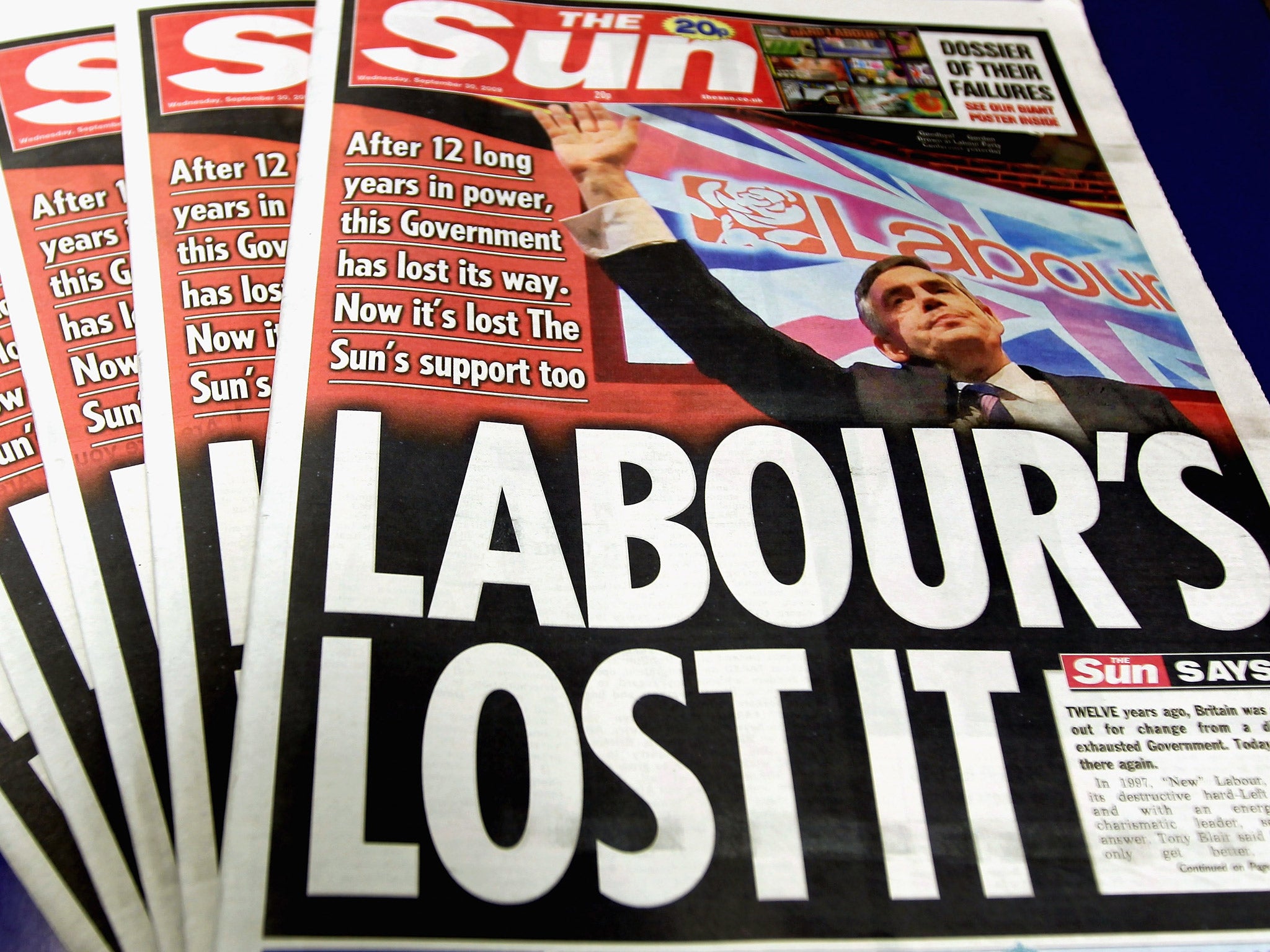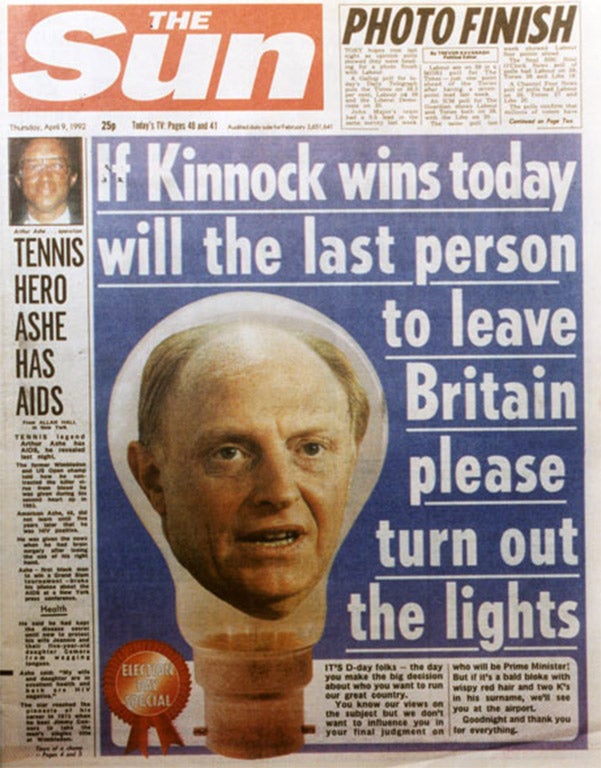General Election 2015 explained: Newspapers
Continuing our daily miscellany celebrating the facts, figures and folklore of British general elections

Your support helps us to tell the story
From reproductive rights to climate change to Big Tech, The Independent is on the ground when the story is developing. Whether it's investigating the financials of Elon Musk's pro-Trump PAC or producing our latest documentary, 'The A Word', which shines a light on the American women fighting for reproductive rights, we know how important it is to parse out the facts from the messaging.
At such a critical moment in US history, we need reporters on the ground. Your donation allows us to keep sending journalists to speak to both sides of the story.
The Independent is trusted by Americans across the entire political spectrum. And unlike many other quality news outlets, we choose not to lock Americans out of our reporting and analysis with paywalls. We believe quality journalism should be available to everyone, paid for by those who can afford it.
Your support makes all the difference.Circulation
Newspapers, especially serious ones, traditionally experience an upsurge in circulation during general elections. In 2010, however, this did not happen. Every national daily showed a decline in circulation in May 2010, from the previous month and from the previous year.
The biggest fallers were The Times (-14.61 per cent year-on-year) and The Guardian (-15.31 per cent year-on-year).
Alignment
An analysis by the authors David and Gareth Butler of national daily newspapers’ political alignment in general elections from 1945 to 2005 (in British Political Facts) found that only two papers had consistently supported the same party in that period’s 17 general elections. The Daily Mirror backed Labour 17 times in a row; the Daily Telegraph backed the Conservatives. (Even the Daily Mail once called for a Conservative-Liberal coalition, in October 1974; while the Daily Express once backed Labour, in 2001.)
The only paper whose (perceived) support was not predominantly given to one party was The Independent.
A study of the 2010 general election by Dominic Wring and David Deacon, of the Department of Social Sciences, Loughborough University, identified the following patterns of alleged “partisanship” in UK national newspapers:
Guardian: Liberal Democrat (moderate)
Times: Conservative (weak)
Telegraph: Conservative (moderate)
Financial Times: Conservative (very weak)
Independent: Liberal Democrat (moderate)
Daily Mail: Conservative (strong)
Express: Conservative (very strong)
The Sun: Conservative (strong)
Daily Mirror: Labour (strong)
Observer: Liberal Democrat (weak)
Independent on Sunday: none
Sunday Times: Conservative (strong)
Sunday Telegraph: Conservative (strong)
Mail on Sunday: Conservative (strong)
Sunday Express: Conservative (very strong)
News of the World: Conservative (very strong)
Sunday Mirror: Labour (strong)
British newspaper coverage of last summer's Scottish referendum (Getty)
Readers
Deacon and Wring also claimed to have detected the following voting behaviour among selected daily papers’ readers in the 2010 general election:
Independent: 29 per cent Lab; 36 per cent Con; 23 per cent Lib Dem.
Times: 22 per cent Lab; 49 per cent Con; 24 per cent Lib Dem.
Telegraph: 7 per cent Lab; 70 per cent Con; 18 per cent Lib Dem.
Daily Express: 19 per cent Lab; 53 per cent Con; 18 per cent Lib Dem.
Daily Mail: 16 per cent Lab; 59 per cent Con; 16 per cent Lib Dem.
The Sun: 28 per cent Lab; 43 per cent Con; 18 per cent Lib Dem.
Daily Mirror: 59 per cent Lab; 16 per cent Con; 17 per cent Lib Dem.
Guardian: 46 per cent Lab; 9 per cent Con; 37 per cent Lib Dem.
Influence
The only election from 1945 to 2005 in which the circulation of the Conservative-supporting papers did not exceed the combined circulation of the papers supporting Labour and the Liberals/Liberal Democrats was that of October 1974, when the press was almost equally divided.
The outcomes of those 17 post-war elections, however, were more evenly split, with eight Conservative victories and nine Labour ones. (If you include the 2010 result, the 18 elections since 1945 have been evenly divided.)
The post-war election in which the press was most overwhelmingly pro-Tory was that of 1983, when 78 per cent of the market (in circulation terms) supported the Conservatives.
Headlines
Notorious general election headlines include:
“Civil War Plot By Socialists’ Masters” – the Daily Mail’s presentation of the (forged) “Zinoviev Letter”, credited with preventing a Labour victory in 1924.
“Whose finger on the trigger?” – the Daily Mirror suggests, in 1951, that an ageing Churchill might start a war.
“Labour’s dirty dozen” – notorious Daily Mail headline in 1979, referring to a dozen alleged “lies”, most of which turned out to be true.)
“Crisis, What Crisis?” – The Sun, 1979 (The phrase referred to remarks made by James Callaghan during the “Winter of Discontent”, and helped to bring down his Labour Government.)

“Do you seriously want this old man to run Britain?” – headline accompanying The Sun’s picture of Labour leader Michael Foot in 1983.
“If Kinnock wins today, will the last person to leave Britain please turn out the lights” – The Sun’s election day headline in 1992. (This was felt to be so effective that it was followed two days later by the famous “It’s the Sun wot won it” front-page headline.)
“The Sun backs Blair” – The Sun’s 1997 headline, marking the end of 20 years of support for the Tories.
“Labour’s lost it” – the headline with which The Sun did another significant volte-face in September 2009.
Accuracy
No celebration of the press’s role in elections would be complete without a nod to the Chicago Tribune’s first-edition front-page headline reporting the US presidential election in 1948: “Dewey Defeats Truman”. (There was just one flaw. He hadn’t.)
On Wednesday: no.16 opinion polls
Join our commenting forum
Join thought-provoking conversations, follow other Independent readers and see their replies
Comments